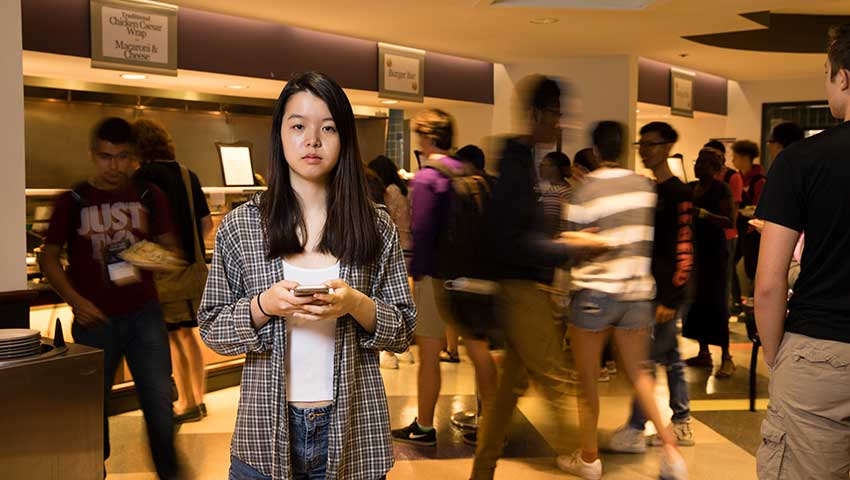A Look at Summer Research

We spend much of our lives just… waiting.
Various studies calculate that a typical person spends anywhere from six months to five years of life waiting in line, whether for grocery checkout, or an amusement park ride, or a new driver’s license.
Jane Kim ’20, a computer science major, is on campus this summer, studying the lines at the College’s dining hall, trying to figure out what makes them speed up or slow down, and she’s testing a hypothesis about how to get people to their food faster.
She knew she wanted to spend her summer studying something “that personally related to me.” And what’s more personal than lunch?
Throughout June and July, at different 30-minute intervals during lunchtime, Kim arrived in Valentine Dining Hall and used her phone to take notes on how long it took people to get through the line and come away with a meal.
Even in the summer, Valentine offers a wide selection at multiple stations. Limiting her readings to the main stations offering multiple hot entrées, Kim counted the number of people who chose each entrée. Her hypothesis: reducing the number of choices on each line would make things run faster. In the computer lab, she tested out scenarios using the data gathered from observing the lines.
Queueing theory is an interest of Kristen Gardner ’12, assistant professor of computer science. She studies “performance modeling”—that is, the development of mathematical solutions that predict system performance.
Gardner mentored Kim and another Amherst student, Crystal (Yujing) Zhou ’21, throughout the Summer Science Undergraduate Research Fellows (SURF) program. Additional Amherst programs funding summer research and other experiences include the Gregory S. Call Undergraduate Research Program, as well as internships administered through the Center for Community Engagement and the Loeb Center for Career Exploration and Planning.
Meet a few of this year’s other researchers:
- Elijah Koome ’19 spent the summer on the project “Trauma and Testimony in Contemporary Kenyan Texts,” funded by the Gregory S. Call Fund, a lead-in to his senior thesis project in black studies, under the guidance of Professor Rhonda Cobham-Sander. “The eight weeks I have been here on campus seem to have gone in a blink,” he said. The time was spent going over a collection of testimonies from victims of the 2007/2008 post-election crisis in Kenya.
- Fernando Garcia Toro ’20, another Call scholar, spent this summer searching for exoplanets (planets outside the solar system) under the supervision of Assistant Professor of Astronomy Kate Follette. “In the Follette lab,” he said, “I analyzed data sets of images of stars V4046 Sagittarii from different years, which consisted of processing the raw images and passing them through complex algorithms to arrive at pictures suitable for analysis.” He then inserted fake planets into the data sets in order to determine to what degree planets would be visible in the results.
- SURF scholar Shashank Sule ’20 worked for Professor Gabriel Sosa in the mathematics and statistics department, studying Toric rings, central objects in the field of commutative algebra. Toric rings—essentially sets of multivariate polynomials—were originally studied by Renaissance mathematicians. Using computational and graph-theoretic techniques, Sule and Sosa were able to solve problems with classical roots using modern methods. “This experience taught me the rigor and tenacity required of a research mathematician,” said Sule, who previously had no research experience.
While Kim watched the line in Valentine, Zhou studied a phenomenon that’s very much on the minds of summer vacationers right now: lines at amusement park rides. She looked at virtual queueing, a technological response to long lines that’s been implemented at various theme parks. Park-goers can check in at a ride and get a wristband, or they can download an app that keeps their place in line; both options allow them to explore the rest of the park instead of waiting. When it’s their turn on the ride, they get an alert and hurry back.
Back in Valentine, Joe Flueckiger, director of dining services, welcomed the scholarship. “We’re trying to predict how things are going to work, and make choices around the popularity of specific items,” he says. While the big picture of dining hall operations would probably preclude adding another line, he says, he is eager for Kim’s suggestions. “Students don’t have a lot of time. They’re in between classes, and we want to respect that they have a limited amount of time to get in and eat and maybe socialize a little bit.”
And no one likes to wait in line.